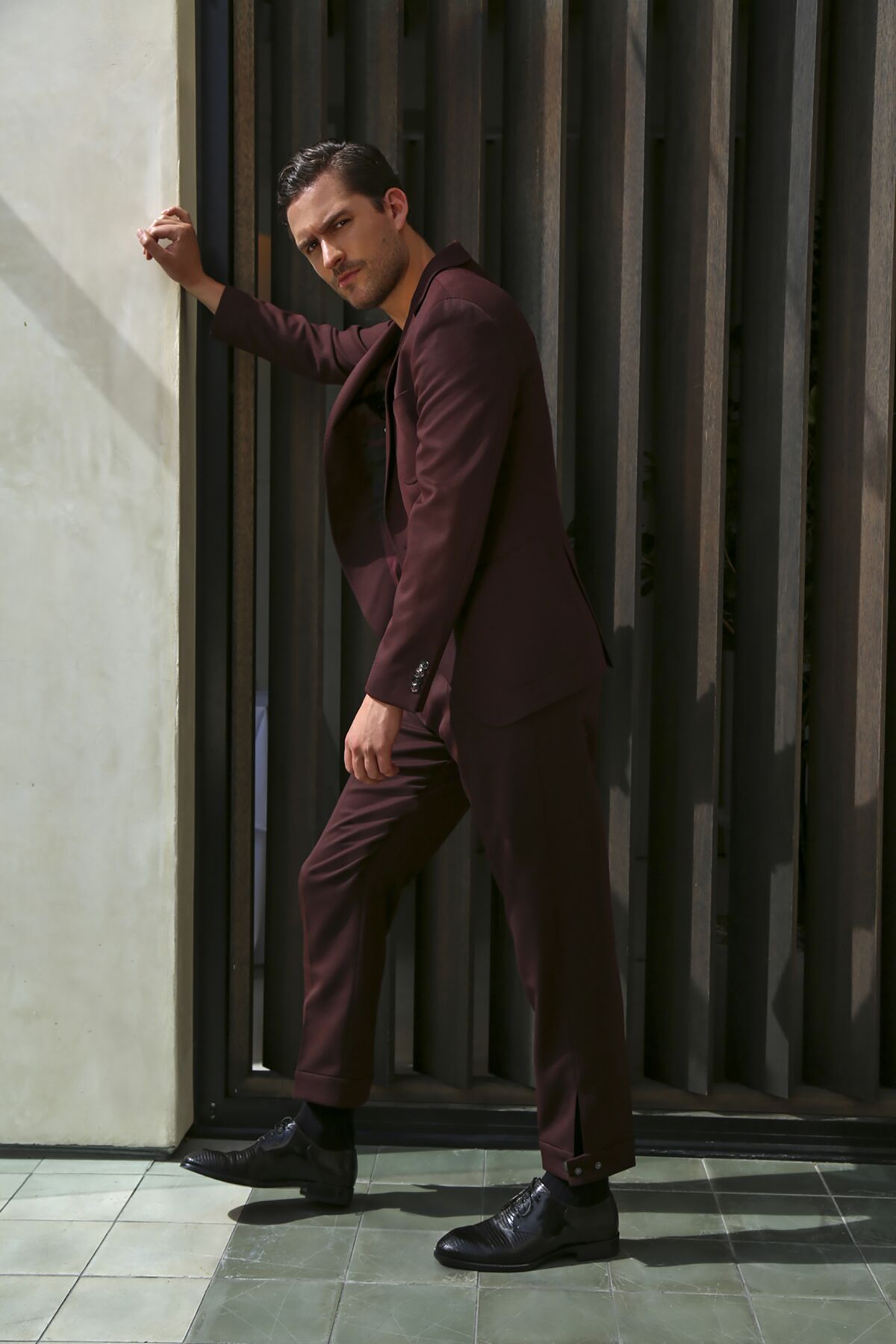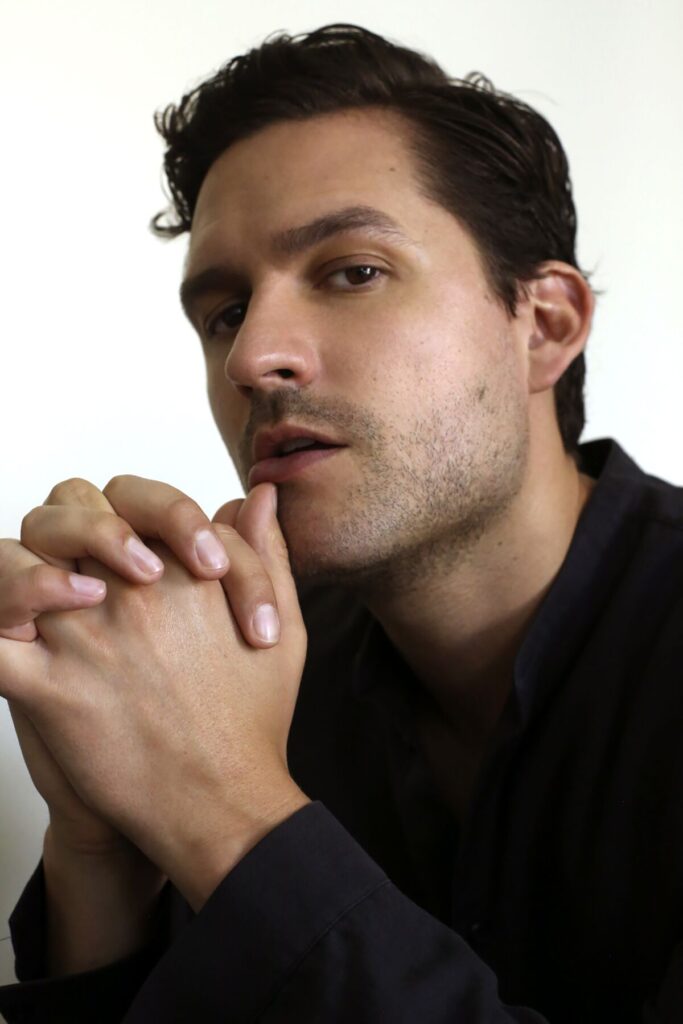Ben Aldridge is excited.
The English actor — who’s worked steadily on London stages (“Romeo and Juliet” at Shakespeare’s Globe, “American Psycho” at the Almeida) and in television on both sides of the Atlantic (“Fleabag,” “The Long Call,” “Pennyworth”) — is vaulting to cinematic leading-man status with the imminent releases of two big studio films: “Spoiler Alert,” Focus Features’ December romantic tragicomedy directed by Michael Showalter (“The Big Sick,” “The Eyes of Tammy Faye”), and “Knock at the Cabin,” M. Night Shyamalan’s February horror thriller from Universal.
The one-two punch just might make Aldridge a major movie star.
“I feel very excited,” he says over Zoom from his London home the night before departing for a stateside press tour. It was also three days before his 37th birthday on Nov. 12. “Although, I will say, having been doing this for 15 years professionally, I know to be very grounded about it. I know it’s all about getting people to see these movies and about them hitting in the correct way.”
The first film is a weepie, co-scripted by David Marshall Grant and Dan Savage, based on Michael Ausiello’s hilarious, heartbreaking 2018 memoir “Spoiler Alert: The Hero Dies.” The story chronicles TV columnist Ausiello’s loss of the love of his life, creative director and photographer Christopher “Kit” Cowan, to cancer — with Aldridge as the hero who dies, and Jim Parsons (“The Big Bang Theory”), who also produced, as Ausiello.
Aldridge never auditioned, winning the role through a mere Zoom meeting with his co-star and the director.
Ben Aldridge says of his back-to-back leads in stories focused on queer couples: “It’s a dream come true.”
(David-Simon Dayan)
“I had not seen him work before,” admits Parsons, who was introduced to Aldridge by casting director Avy Kaufman. Within 90 seconds, the chemistry was clear. “I just fell more and more in love with him and the idea of him playing that role.” But Parsons wasn’t sure what Showalter thought. “He called immediately,” Parsons recounts, “and said, ‘I think he’s the one, don’t you?’”
Once cast, Aldridge pored over not only Ausiello’s book but also the home movies the author shared, including that of Kit’s memorial. “I was just hit by the overwhelming responsibility of telling Kit’s story, of telling their story,” Aldridge says. “He was becoming real for me in the book. But then he was absolutely, fully real for me because I was watching video footage of him.”
During filming, Ausiello guided Aldridge and also entrusted the actor with Kit’s personal effects. “The small, black point-and-shoot camera I use in the film was Kit’s actual camera — and that felt very powerful, to have that in my hands.”
Parsons and Aldridge formed a powerful bond.
“We just became such incredible friends,” Aldridge says. “I don’t think in my time as an actor I’d ever experienced someone else believing in me as much as Jim seemed to believe in me. … And it was a two-way thing. We so believed in each other as these characters and our ability to play them and our passion for them.”
Then there was Sally Field. “I couldn’t believe I was going to play her son,” Aldridge says, chuckling.
His prep included rewatching her in “Steel Magnolias.” “I had this moment, sitting in the hospital bed, being sickly. I was like, ‘I’m Julia Roberts! I feel like Shelby! [Field] was wrapping blankets around me. … It was very surreal.”
Field appreciated Aldridge’s talent immediately. “He has no difficulty walking the line between comedy and drama,” she says, noting that many actors can do only one or the other.
And she could see he is destined for fame. “I saw it was going to happen to Julia,” she says. “Danny Glover was another.” Aldridge too: “I kept saying, when we were shooting — not to him, because that doesn’t serve an actor — to Showalter or to some of my friends, ‘Oh, my God. He is an absolute star. There’s no question.’”

Ben Aldridge.
(David-Simon Dayan)
Aldridge found that the oncology appointment scenes peppered throughout the film as Kit’s disease worsens were some of his toughest — they were shot back-to-back early in the schedule.
And Kit’s death was a unique challenge.
“We did enough takes for my hospital gown to be wet with Sally Field’s tears,” he says.
Aldridge didn’t interact with his co-stars that day, choosing to remain silent, eyes closed. “It was very strange to be on the receiving end of that level of grief. I remember going home at the end of that day and thinking, ‘Wow, what an odd experience to feel like you died, but you’re really alive.’”
Is a movie in which the hero succumbs to cancer too much to bear at the holidays? “I don’t think you leave feeling sad or depressed,” Aldridge says. “You leave feeling inspired. … You can’t love without the risk of heartbreak. Michael’s book, and our movie, taught me to love better.”
Aldridge’s hunger to perform surfaced early. He understood he was different by age 8, was called “gay” and was bullied. “I grew up in an evangelical household, and through osmosis, from society, had absorbed that being gay wasn’t really an option or a good thing to be,” he says, adding that he’s no longer a Christian.
He wasn’t interested in sports and remembers praying “to be a normal boy”: “I wanted to not be who I was, basically.”
But his parents saw his true interests and were supportive of him going to stage school three nights a week, dance school on weekends, National Youth Theatre in the summer. “They really encouraged me, always making sure I could pursue those hobbies.”
Aldridge first kissed a man at 23, came out to his wider circle of friends at 25 and told his parents at 26. By then, he’d studied at the London Academy of Music and Dramatic Art and was working, but his secret identity was easily and completely hidden on set. “There was a sense of achievement to be playing straight roles despite who I knew I was inside,” he says, confessing he feels some shame about that today. “But along with that, there was a lot of paranoia, a lot of extra energy spent worrying.”
It wasn’t until June 27, 2020 — World Pride Day — that Aldridge made a life-changing move. “I’d felt for quite some time that I was conveniently hiding behind an outward perception that I’m straight,” he says.
So he took to Instagram to make an announcement. He doesn’t see that post as coming out, necessarily. “I view it as claiming my true identity. Just saying, ‘Actually, this is who I am, and I’m really proud of that.’ It’s one of the best decisions I’ve ever made.”
Certainly, Aldridge was buoyed by out peers like Jonathan Bailey, Matt Bomer, Ben Whishaw and others. But there was also Rupert Everett’s voice — who famously said coming out ruined his career — running though his head. The truth won out, showbiz be damned: “I’d finally reached a moment where I felt, if this is going to impact my career negatively, if people don’t want to work with me based on this truth, I don’t want to work with them.”
M. Night Shyamalan did want to work with him — Aldridge found out the director was eyeing him for “Knock at the Cabin” on the day “Spoiler Alert” wrapped.
Based on Paul Tremblay’s 2018 novel, “The Cabin at the End of the World,” the film revolves around married gay dads — Aldridge and Jonathan Groff (“Frozen,” “Hamilton”) — vacationing with their young daughter and taken hostage by four strangers.
“I’m very excited to be working at a level that I’ve desired and had ambition to be working at for a long time,” Aldridge says.
It would be hard to find two more opposite directors than Shyamalan and Showalter. “They’re both incredible at what they do, but it was chalk and cheese for me,” the actor says.
Extremely proud of his two first studio films, Aldridge thinks back to his 22-year-old self, on his first set, playing the straight romantic lead in a period drama. “I would never, ever have dreamt, seriously, that I’d be getting to work in this way, playing so authentically, and playing queer parts,” he says. “It’s a dream come true.”

